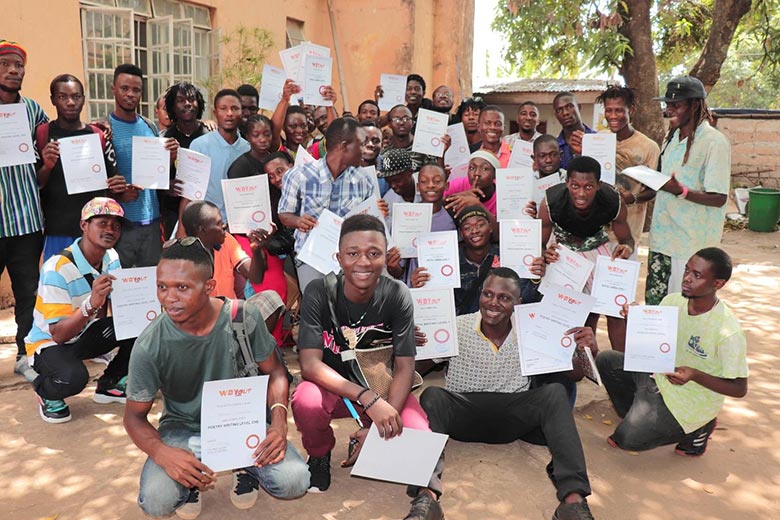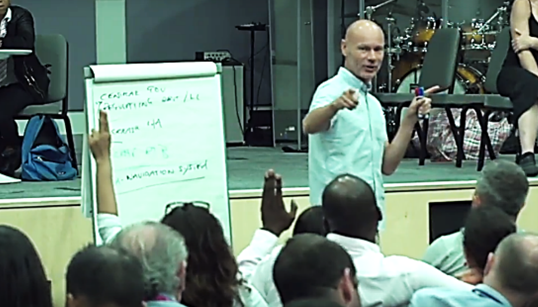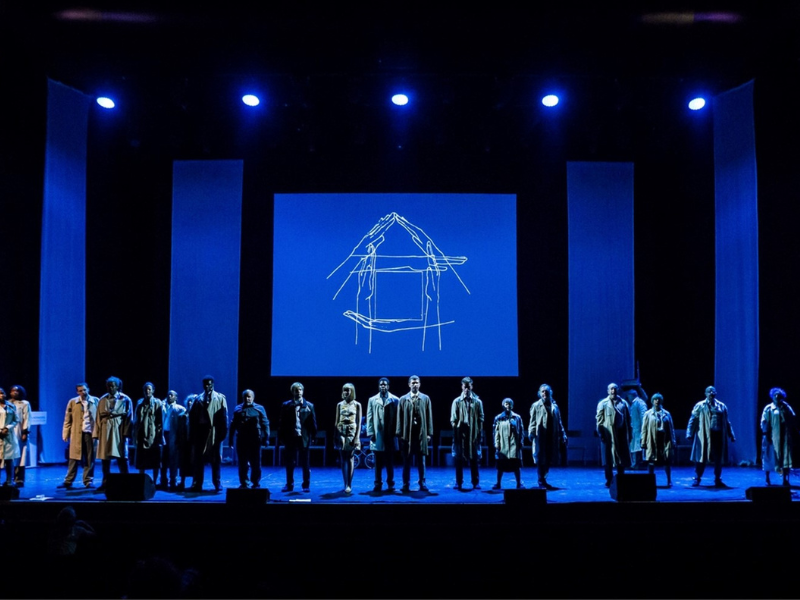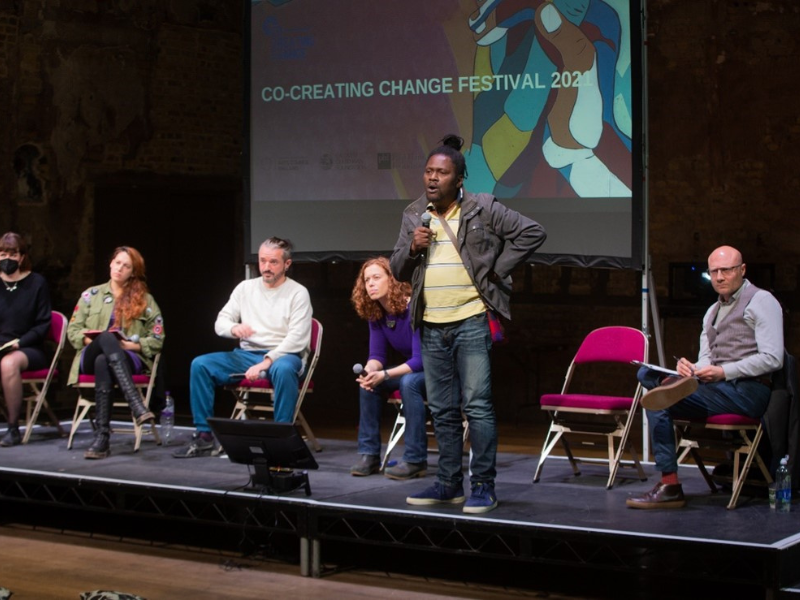Michael Chandler, Chief Executive at Groundswell, a charity that exists to enable people who have experience of homelessness to inform solutions to issues related to homelessness and inclusion health, has over 20 years’ experience working for social justice organisations.
Michael was the CEO of Union Chapel, the community social justice charity and cultural events venue in Islington. He was previously Acting CEO / Director of Social Change at Cardboard Citizens, leading their national partnerships and campaigning, and has experience at a range of organisations such as Shelter, as well as exploring arts for social change through ASC Agency.
Emma Boyd, Head of Marketing and Communications at SMK, and Michael met up to discuss his long standing work in the field of art and social change.
EB: You’ve had a long history of work that connects the arts and activism with some of the most challenging social justice issues of the day. How did you start your journey into social change work?
MC: This goes right back to my youth. My mum was a human-rights documentary filmmaker so I was exposed to and understood the power of media and film in sharing stories and raising awareness about issues audiences weren’t aware of.
I have always been personally passionate about arts and creativity. In my teens, I got into hip-hop – partly because of the energy but also because of the powerful and urgent social commentary. I became a producer and DJ on pirate radio until my late 20s, and then a filmmaker, producing dramas around mental health, poverty, racism and domestic violence.
In 2007, two things happened that cemented my passion and understanding of the arts for social change. First, I went to volunteer in Sierra Leone, where I saw how young people were using music as their form of protest, in the face of what they perceived to be a corrupt government and similarly corrupt opposition. This inspired me to co-found WAYout, which aims to empower young people to share their stories and raise awareness through music and media. They are still going strong.

I feel like I’ve gone from nobody to somebody’, Nandaywa who learnt media at WAYout and now works for major TV stations
At the same time I was working at Shelter. I ran a project in Newham for families in temporary accommodation for homeless charity Shelter using a series of educational and creative projects to build confidence and help children with their schooling. One project, called In Their Own Words used stop animation as a way for children to talk about their experiences. The films were also used for wider campaigning and made a real impact.
These projects solidified a few things for me- that arts and creativity could empower individuals to share their stories and build their confidence; that art could be at its most powerful and authentic when they were co-created with people experiencing the issues; and that this artistic output could then change perceptions and, potentially, affect real change.
In 2013, I joined Cardboard Citizens, which really consolidated all of this for me. I was able to trial and evidence the impact of our work, this approach called Forum Theatre and the wider Theatre of the Oppressed methodology, on real social and systemic change.
EB: Do you think it is possible for the arts to not just raise awareness, educate and inform but also have an impact on advocacy and influencing work? Do you think it is possible for creatively to drive policy change?
MC: Absolutely, and I’ve seen and been involved in making it happen. Broadly, arts and culture has the ability to frame experiences and injustices in ways that can reach across and engage a range of audiences – including those who hold power – and both challenge perceptions people may have of an issue, as well as connect emotionally and as a result galvanise audiences to do something about it. And, if these events, exhibitions and artistic interventions are managed strategically, in terms of identifying who you want in the room and what you want them to commit to- it can and does influence and inform policy and systems change.
Between 2014 and 2019, whilst at Cardboard Citizens, I led a series of national Forum Theatre projects, and partnerships with major charities, housing associations, local authorities and other partners.
In the majority of them, the projects not only had a positive impact on the participants, but in some way either influenced staff that attended, or in some cases led to policy and systemic changes at those organisations – from local authorities, to theatres and arts organisations we partnered with.

Forum theatre projects with local authorities, housing associations, the NHS and other services improving practice and informing policy development – Tony McBride facilitating
I became increasingly involved in arts and campaigning through this. Initially, some of the housing associations we worked with came back to us and wanted to use the approach and performances as part of the 2015’s Homes For Britain campaign.
In 2016, the stage version of Cathy Come Home, brought them together to support that event, and the subsequent tour. Of course, Ken Loach’s original ‘Cathy Come Home’ is a perfect example of arts informing change. In 1966, it transformed the public understanding of homelessness, led to or coincided with a number of major homeless charities and housing associations being born.
I became increasingly involved in arts and campaigning through this. Initially, some of the housing associations we worked with came back to us and wanted to use the approach and performances as part of the 2015’s Homes For Britain campaign.
In 2016, the stage version of Cathy Come Home, brought them together to support that event, and the subsequent tour. Of course, Ken Loach’s original ‘Cathy Come Home’ is a perfect example of arts informing change. In 1966, it transformed the public understanding of homelessness, led to or coincided with a number of major homeless charities and housing associations being born.

Cathy Come Home, performed by Cardboard Citizens member actors at Barbican for its 50th anniversary in 2016
Then there was the Turned Away research, where we and a group of Cardboard Citizens’ actors worked with Crisis as mystery shoppers investigating how they would be treated by housing services when presenting as homeless. The mystery shoppers became undercover reporters for Channel 4 Dispatches , for Undercover: Britain’s Homeless Scandal, and the research led to Crisis’ No One Turned Away campaign – which, subsequently led to the Homelessness Reduction Bill following a lengthy campaign Crisis led. It was fascinating to watch and support that campaign, and support it in the way we did and could.
At the same time, we were touring Cathy and, we used a light-touch version of Legislative Theatre*, collecting a series of law changes our audiences were suggesting to address the issues highlighted in Cathy. These became our Cathy Laws.
Homes for Cathy invited us to perform and present the Cathy Laws at their launch, which coincided with the third reading of the Homelessness Reduction Bill – which, soon after, became the act! It was even awarded Best Coalition at SMK’s National Campaigner Awards 2018.
(Interestingly, I was very recently at a homelessness lobby at Parliament and Bob Blackman, the MP who led the Members Bill, once again cited that mystery shopper research with Crisis as inspiration for the Homelessness Reduction Act).
I learnt and saw more about how Legislative Theatre works, and I’m personally a big Legislative Theatre advocate! It has had some impressive results influencing and changing policy – but I know that arts and culture – and artists and practitioners with communities – have led to some real change elsewhere, as highlighted above.
EB: In 2017-18, you ran a series of Arts for Social Change events with SMK. You brought together creatives and campaigners, bringing together examples of arts and social change that stood out to you, to explore how art and creativity can affect social and political change. Can you tell me a little more about this?
MC: I loved these events. Starting 6 years ago in 2018, we ran five events in total across England, like mini-conferences, which brought together artists, campaigners, people with lived experience, and also people from marketing and comms agencies like Good Agency and Mother.
At the first event, we had Greenpeace talking about their animated film Rang-Tan, Grime4Corbyn talking about their campaign bringing grime artists together to get young people to vote around the 2017 election, CALM talking about their extremely powerful Project 84, where artist Mark Jenkins produced life-sized statues on the edge of the Southbank Centre’s roof, to highlight 84 men that die by suicide each week in the UK.
We ran events across the UK with brilliant organisations like Good Chance, Knowles West Media, Beats Bus, Culture Unstained and more. These all served to highlight the diverse approaches and artforms used to raise awareness, and the real measurable impact these all had.
One of the best sessions was, of course, our speed campaigning – with a great presentation from Sue Tibbals to kick it off! It was great, high energy, and some of the campaigns created in just an hour were brilliant. There’s a great video here featuring Sue and the other artists and activists.
It led to the creation of the Arts for Social Change Network, over 400 artists and campaigners interested in collaborating, and I know a few of them did. I made plans to run these events in some form at Union Chapel, but Covid paused that. But, I still plan to run these again, soon….
When we started the Arts for Social Change network back in 2017 it did feel like we were only scratching the surface. In the last six years, more people, campaigners and organisations, have embraced creative – and co-created – approaches to campaigns to engaged wider audiences and challenge perceptions and inform change.
EB: Would be great to know more about Audience Activator, and its inspiration. I believe you are still involved with this in relation to ASC Agency – and audience activation. Galvanising and activating audiences.
MC: So, following a Forum Theatre tour we did at Cardboard Citizens in 2015 and some other research we did on social-justice-based theatre, we heard from audiences that whilst the performances connected with them emotionally, they felt angry about the issues, frustrated, and galvanised to do something – but didn’t know what to do.
For the Cathy tour, we trialled #CitizensDo – audiences were asked to sign up following a performance, and would receive actions they could take in the weeks following – from donating to a foodbank, to buying someone a coffee, all the way to opening up their spare room if they had one through one of the host schemes like Depaul Nightstop.

Cathy cast and the #CitizensDo campaign
Over 1,000 people signed up across the tour, and from the survey we did, we know that 78% of people that responded took an action – and the other 22% still wanted to. (It also won Best Digital Campaign at SMK’s Campaigner Awards 2019!)
Since then, separately with ASC Agency, we’ve developed the approach to see if we can do this with other artforms and justice issues. Our Audience Activator tool is receiving some funding, and there’s a project moving forwards later in 2024, which could be both powerful, timely and I’m really excited about.
EB: When we met you spoke a little bit about other examples of your work bringing the arts, culture and social justice together, particularly during the pandemic. Can you outline a few of these?
MC: In September 2019 I joined Union Chapel as their first CEO. It was a place known well for being a music venue, less well for being a place supporting the community and committed to championing social justice. We had some great plans around being a venue bringing together culture, community and social justice – a real centre where it all meets, a literal stage for arts and social change. Then, 6 months later, Covid hit.
The pandemic obviously heavily impacted plans, and posed a real challenge– but we were still able to drive forwards and pioneer an amazing range of arts and social justice programmes, and the support it got was humbling.

Union Chapel space converted to a food donation hub
We closed doors for events mid March – but we pivoted and knew we could provide more for the local community. This ranged from converting our space into a donation bank, direct connection & support, food to people experiencing homelessness, working with a number of great partners, isolation and in need in the local community during lockdowns, and hosting a range of brilliant organisations like Company 3, Accumulate, then, a range of cocreated creative health and wellbeing programmes and community empowerment projects like the Community Leaders, a Legislative Theatre programme that led to 3 policy commitments from Islington Council and a new organisation Change Act CIC, and New Voices providing a platform to young artists impacted by the pandemic.

Community Leaders at Co-Creating Change festival
And there was the more high profile events bringing together culture, politics and social justice too. We pioneered live streamed music events in June 2020 (which I think bought hope as well as jobs and a model others used); hosted important programmes like Channel 4’s The Whole Truth (raising awareness around mental health and racism including Kojey Radical, Arlo Parks), to people like Michaela Coel, Adam Kay, Ed Sheeran championing youth mental health, as well as activists and people in power, from Extinction Rebellion to Sadiq Khan. A real mixing pot of culture and social justice.
We achieved and learnt a lot despite the circumstances; from the power and importance of arts and culture and people’s creativity in dark times, and not least other arts organisations and venues across the UK doing great work with and for their communities, particularly in these challenging times. I was very proud when we got shortlisted for Award for Civic Arts Organisations alongside brilliant organisations like ACAVA, In Place of War, Project Art Works.

‘You don’t know what prejudice look like’ – Che Lingo on The Whole Truth

Change Act CIC community workshop at Union Chapel
Whilst that time was enormously difficult, it does feels like there’s been a change in recognition in the last 5 years of the importance of arts and culture in social change – possibly accelerated by that time – from the community level to more recent high profile examples like Mr Bates v The Post Office. It’s exciting to see and hear what people are doing in this arena now, and explore what may be possible – and great to see it supported by SMK through things like the Creative Change-Makers award.
EB: Congratulations with your new role as CEO at Groundswell. What does Groundswell do, and does arts and social change play a part?
MC: Thank you. Groundswell is truly an amazing organisation – real sector leaders in participation, ensuring the lived experience of people is at the heart of the solutions, and doing outstanding work around inclusion health, peer advocacy, research, and participation and progression. 60% of our staff have lived experience, and I have been humbled and utterly inspired by what we do, our team are quite literally saving lives.
Whilst it’s not the focus of Groundswell’s work, Groundswell have also combined arts, culture and media in previous campaigns with some powerful results, including the brilliant Clarissa, To Whom It May Concern, and currently the ListenUp! community reporters, alongside creative health projects around wellbeing, sharing stories and building community. There are other exciting projects involving creativity on the horizon too – including research with Northumbria University aiming to transform care for people experiencing homelessness to include creative health approaches in holistic support; and our very own Legislative Theatre project with a London focus – watch this space!
Thank you!
*Legislative Theatre is part of the Theatre of the Oppressed methodology, which takes the explorations and debates started through the Forum Theatre to the next step, and explores – recognising that a lot of the issues and experiences we highlight in our stories are not in the control of individuals but are caused by wider systemic issues – what are the policy changes that need to occur to improve the systems and address the issues individuals and communities are experiencing. The events include ‘policy-makers’ who sit on an expert panel, hearing and collating the policy suggestions from audiences It’s great to see how it’s being embraced, as it’s increasingly being recognised as a powerful creative approach to participatory democracy, in no small part thanks to the work of Katy Rubin, who I’ve had the pleasure of collaborating with several times and other fantastic practitioners across the globe. Katy Rubin has done a great summary here.
At SMK, we are curious about how change happens and are interested in the intersection between art and social change. As part of our work to share our evolving understanding of social change, we will interview artists whose work is based in change-making and activism and who seek to understand and highlight contemporary social issues through their practice.
